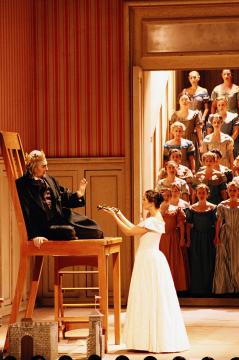
As you may or may not know, Franz Schubert wrote operas, largely unknown today. In fact, the
Théâtre du Châtelet gave the French premiere of one of them last month,
Fierrabras, brought to Paris in the 1997 production of the
Zurich Opera. Marie-Aude Roux wrote a review (
Un remarquable "Fierrabras", March 10) for
Le Monde (my translation):
Composed in 1823, the year of Die schöne Müllerin, [the opera] was halted in the middle of rehearsal, with the failure of Weber's Euryanthe, which sounded the temporary eclipse of German opera by Italian opera. Extracts from the work, performed in concert version in 1858, provoked the ire of the famous German critic Eduard Hanslick, who singled out the composer's renunciation "of everything that could be called poetry, good taste, coherence." We would have to wait until 1897, the centenary of Schubert's birth, for the opera -- with numerous cuts and ballet insertions -- to be premiered in Karlsruhe; until 1988 for Fierrabras finally to be restored to its original and complete form, in Vienna, under the direction of Claudio Abbado.
Director Claus Guth points to the relative incoherence of the libretto, so often the case with Schubert. (Josef Kupelwieser's libretto was drawn from the 12th-century chanson de geste relating Charlemagne's crusade against the Moors and the conversion of Fierrabras to the Christian faith.) The staging is playful, with its living room sets, its cuckoo clock, and its oversized children's play furniture, which does not lack elegance. Schubert is there, in flesh and blood, thanks to actor Wolfgang Beuschel, the "little mushroom" as close to life as possible.
Madame Roux praised the cast and the conducting of Franz Welser-Möst, leading the Zurich Opera Orchestra. Jean-Louis Validire also wrote a review (
Les rêves de Schubert, March 10) for
Le Figaro, which struck the same tone. You can see
some pictures on the Zurich Opera's Web page.
 As you may or may not know, Franz Schubert wrote operas, largely unknown today. In fact, the Théâtre du Châtelet gave the French premiere of one of them last month, Fierrabras, brought to Paris in the 1997 production of the Zurich Opera. Marie-Aude Roux wrote a review (Un remarquable "Fierrabras", March 10) for Le Monde (my translation):
As you may or may not know, Franz Schubert wrote operas, largely unknown today. In fact, the Théâtre du Châtelet gave the French premiere of one of them last month, Fierrabras, brought to Paris in the 1997 production of the Zurich Opera. Marie-Aude Roux wrote a review (Un remarquable "Fierrabras", March 10) for Le Monde (my translation):
No comments:
Post a Comment